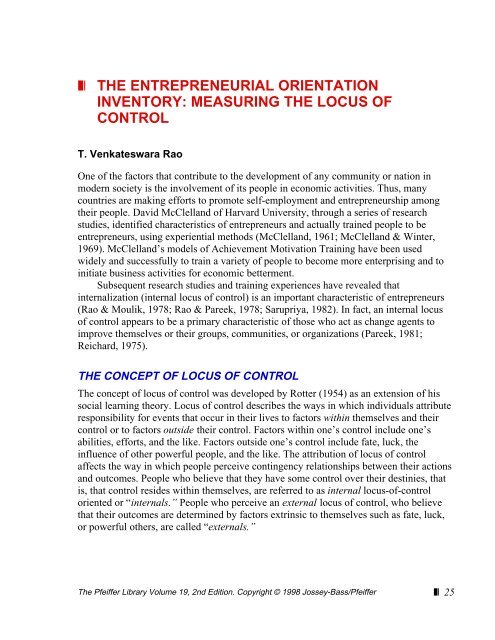motivational analysis of organizations
motivational analysis of organizations
motivational analysis of organizations
You also want an ePaper? Increase the reach of your titles
YUMPU automatically turns print PDFs into web optimized ePapers that Google loves.
❚❘ THE ENTREPRENEURIAL ORIENTATION<br />
INVENTORY: MEASURING THE LOCUS OF<br />
CONTROL<br />
T. Venkateswara Rao<br />
One <strong>of</strong> the factors that contribute to the development <strong>of</strong> any community or nation in<br />
modern society is the involvement <strong>of</strong> its people in economic activities. Thus, many<br />
countries are making efforts to promote self-employment and entrepreneurship among<br />
their people. David McClelland <strong>of</strong> Harvard University, through a series <strong>of</strong> research<br />
studies, identified characteristics <strong>of</strong> entrepreneurs and actually trained people to be<br />
entrepreneurs, using experiential methods (McClelland, 1961; McClelland & Winter,<br />
1969). McClelland’s models <strong>of</strong> Achievement Motivation Training have been used<br />
widely and successfully to train a variety <strong>of</strong> people to become more enterprising and to<br />
initiate business activities for economic betterment.<br />
Subsequent research studies and training experiences have revealed that<br />
internalization (internal locus <strong>of</strong> control) is an important characteristic <strong>of</strong> entrepreneurs<br />
(Rao & Moulik, 1978; Rao & Pareek, 1978; Sarupriya, 1982). In fact, an internal locus<br />
<strong>of</strong> control appears to be a primary characteristic <strong>of</strong> those who act as change agents to<br />
improve themselves or their groups, communities, or <strong>organizations</strong> (Pareek, 1981;<br />
Reichard, 1975).<br />
THE CONCEPT OF LOCUS OF CONTROL<br />
The concept <strong>of</strong> locus <strong>of</strong> control was developed by Rotter (1954) as an extension <strong>of</strong> his<br />
social learning theory. Locus <strong>of</strong> control describes the ways in which individuals attribute<br />
responsibility for events that occur in their lives to factors within themselves and their<br />
control or to factors outside their control. Factors within one’s control include one’s<br />
abilities, efforts, and the like. Factors outside one’s control include fate, luck, the<br />
influence <strong>of</strong> other powerful people, and the like. The attribution <strong>of</strong> locus <strong>of</strong> control<br />
affects the way in which people perceive contingency relationships between their actions<br />
and outcomes. People who believe that they have some control over their destinies, that<br />
is, that control resides within themselves, are referred to as internal locus-<strong>of</strong>-control<br />
oriented or “internals.” People who perceive an external locus <strong>of</strong> control, who believe<br />
that their outcomes are determined by factors extrinsic to themselves such as fate, luck,<br />
or powerful others, are called “externals.”<br />
The Pfeiffer Library Volume 19, 2nd Edition. Copyright © 1998 Jossey-Bass/Pfeiffer ❚❘ 25

















